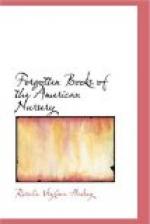But in Boston the people bought directly from the booksellers, of whom there were already many. One of these was John Mein, who played a part in the historic Non-Importation Agreement. In seventeen hundred and fifty this Englishman had opened in King Street a shop which he called the “London Book-Store.” Here he sold many imported books, and in seventeen hundred and sixty-five, when the population of Boston numbered some twenty thousand, he started the “earliest circulating library, advertised to contain ten thousand volumes."[73-A] This shop was both famous and notorious: famous because of its “Very Grand Assortment of the most modern Books;” notorious because of the accusations made against its owner when the colonials, aroused by the action of Parliament, passed the Non-Importation Agreement.
Before the excitement had culminated in this “Agreement,” John Mein’s lists of importations show that the children’s pleasure had not been forgotten, and after it their books singularly enough were connected with this historic action.
In 1766, in the “Boston Evening Post,” we find Mein’s announcement that “Little Books with Pictures for Children” could be purchased at the London Book-Store; in December, 1767, he advertised through the columns of the “Boston Chronicle,” among other books, “in every branch of polite literature,” a “Great Variety of entertaining Books for CHILDREN, proper for presents at Christmas or New-year’s day—Prices from Two Coppers to Two Shillings.” In August of the following year Mein gave the names of seven of Newbery’s famous gilt volumes, as “to be sold” at his shop. These “pretty little entertaining and instructive Books” were “Giles Gingerbread,” the “Adventures of little TOMMY TRIP with his dog JOULER,” “Tommy Trip’s Select Fables,” and “an excellent Pastoral Hymn,” “The Famous Tommy Thumb’s Little Story-Book,” “Leo, the Great Giant,” and “URAX, or the Fair Wanderer—price eight pence lawful money. A very interesting tale in which the protection of the Almighty is proved to be the first and chief support of the FEMALE SEX.” Number seven in the list was the story of the “Cruel Giant Barbarico,” and it is one of this edition that is now among the rare Americana of the Boston Public Library. The imprint upon its title-page coincides with Isaiah Thomas’s statement that though “Fleming was not concerned with Mein in book-selling, several books were printed at their house for Mein.” Its date, 1768, would indicate that Mein had reproduced one of his importations to which allusion has already been made. The book in marbled covers, time-worn and faded now, was sold for only “six-pence lawful” when new, possibly because it lacked illustrations.
[Illustration: Miss Fanny’s Maid]
One year later, when the Non-Importation Agreement had passed and was rigorously enforced in the port of Boston, these same little books were advertised again in the “Chronicle” of December 4-7 under the large caption, PRINTED IN AMERICA AND TO BE SOLD BY JOHN MEIN. Times had so changed within one year’s space that even a child’s six-penny book was unpopular, if known to have been imported.




